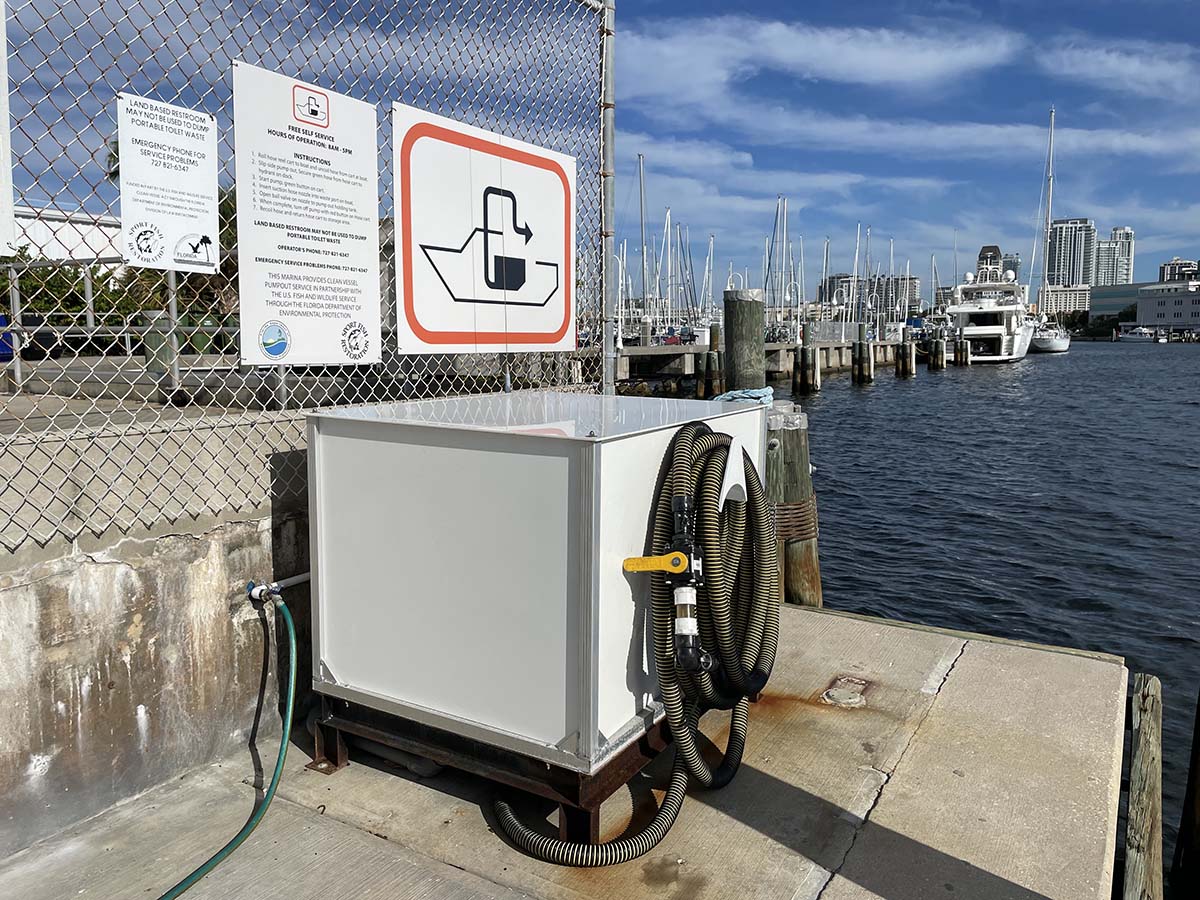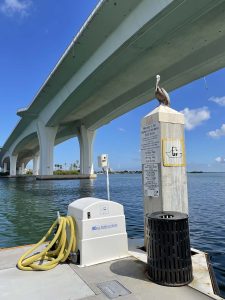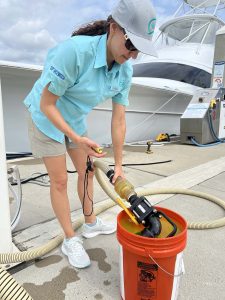
Florida Sea Grant Seeks Input on Sewage Management and Pumpouts
Published on April 7, 2024Editor’s Note: The Florida Sea Grant survey can be found here.
Florida’s coastline is not only a treasure trove of natural beauty but also a crucial ecosystem supporting diverse marine life. However, this paradise faces a potential threat from illegal dumping of waste, jeopardizing the health of marine environments and the livelihoods of coastal communities.
To shed light on the severity of this issue and find steps to alleviate it, Florida Sea Grant is conducting a survey as part of a comprehensive needs assessment that looks at boating infrastructure in the state. Housed at the University of Florida, Florida Sea Grant is one of 34 regional programs under the umbrella of the National Sea Grant College Program.
Obtaining Reliable Information
The survey is designed to help determine the recreational boating community’s level of knowledge, attitudes and behaviors regarding boat sewage management.
The survey is available online at flseagrant.org. It also has been emailed to boating facilities and partners and promoted at boat shows. It will be available for responses through June 2.
“I am hoping to have 1,000 boaters complete the survey,” said Victoria Gambale, Florida Sea Grant Clean Vessel Act education coordinator. “Although this is a small percentage of all the boaters in Florida, it is considered a robust sample size with a 95% confidence level and a 5% margin of error.”

Pumpout stations play an important role in maintaining a clean and healthy environment for coastal waters
Based on preliminary results from the survey, most boaters properly dispose of their waste and do not illegally dump it overboard. However, obstacles like a lack of available pumpouts in their area may lead to illegal discharge of waste. Pumpouts are primarily located at marinas or docks.
“Boating facilities like marinas, fuel docks, launch ramps and others are essential partners in this work,” Gambale said. “Marina managers are one of the top places boaters turn to for reliable information, so we want to support these facilities in their efforts to provide boaters with accurate information.”
Pumpout stations play a pivotal role in maintaining a clean and healthy environment for coastal waters. These facilities provide boaters with convenient and environmentally responsible means of disposing of sewage and other waste, thus reducing the incentive for illegal dumping. Their availability also leads to the preservation of water quality, protection of marine habitats and support of the vital coastal ecosystems.
The Big Picture
The survey is part of broader research into the availability and location of pumpout stations. Florida has been receiving grants for the installation, operation or maintenance of pumpout stations through the Clean Vessel Act of 1992 since 1995. While records have been kept of every grant distributed, that doesn’t necessarily reflect the actual number.
“Not all CVA pumpouts still exist,” Gamble said. “They get destroyed by foul weather, and over time they just break down like any other piece of equipment, and the facility may or may not choose to replace the pumpout. Additionally, many facilities choose to install pumpouts without using CVA funding.”
Two important aspects of this research are finding out how many pumpouts or port-a-potty dump stations are currently available to boaters and determining where they are located.
“More specifically, we’re looking to determine how many recreational boats have access to the water in each county,” Gambale said. “We are then comparing that to how many sewage disposal resources are available.” She said once this research is completed, hopefully by September, Florida Sea Grant will have the answer to those questions.
Gambale said Florida Sea Grant is trying to make it easier for boaters to find working pumpouts through Pumpout Nav, a free IOS and Android mobile phone app.
“The app is color coded, so boaters know which units work (green) and which ones are temporarily broken (red),” she said.
Additionally, through the app, boaters can “report a problem” with a pumpout, which will update the pin color to orange to let other app users know. A new feature under development also allows boaters to confirm a “unit works.” This will also update the pin color to green and will update the timestamp so that boaters know when the status was changed. While these new features are being rolled out, Gambale cautions that app bugs are being identified and repaired.

Pumpout Nav currently lists 255 pumpouts. Private pumpouts or those available only to members or customers of a particular facility are not included.
Focusing Future Efforts
Gambale said the results of the needs assessment and the survey will both help determine where Florida Sea Grant’s efforts should be targeted.
“We know we need both education and more pumpouts installed,” she said.
“The infrastructure portion of the needs assessment will tell us how many more, if any, pumpouts and dump stations we need in each county. The survey will help tell us what topics to focus on.”
Topics could include tips on how to use a pumpout, providing information about what discharge limits are, given Florida’s expansive state waters along the Gulf Coast, and specific boat sewage laws.
Because pumpouts are so vulnerable to the wide array of elements along the coast of Florida, Gambale said the need for continued updating and upgrading of pumpouts will always exist. Finding areas of the state that may be in need of additional pumpouts will be addressed through the needs assessment and survey.
Ultimately, Gambale said the organization wants the survey to give “real world” data that will result in an uptick in availability and usage among boaters.
“I believe that a network of conveniently located and functional pumpouts throughout the state will ensure pumpout usage,” she said. “Boaters love our waterways. That’s part of why they boat, and they want clean, unpolluted water for themselves, their children and future generations. We want to help make sure they have the resources they need to properly dispose of waste.”
The benefits of expanding pumpout infrastructure extend beyond mitigating illegal waste dumping, she said. Promoting proper waste disposal practices and committing to strategic pumpout stations will impact not only environmental protection but enhanced recreation and tourism as well, Gambale said she believes, adding that the Florida Sea Grant project is an investment into the preservation of Florida’s coastal heritage for future generations.
| Categories | |
| Tags |






